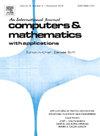A second-order maximum bound principle-preserving exponential Runge–Kutta scheme for the convective Allen–Cahn equation
IF 2.9
2区 数学
Q1 MATHEMATICS, APPLIED
引用次数: 0
Abstract
We present and analyze a time-stepping scheme that is efficient and second-order accurate for the convective Allen–Cahn equation with a general mobility function. By employing the second-order central finite difference discretization for the diffusion term and the upwind discretization for the advection term, we develop a temporally two-stage second-order exponential Runge–Kutta scheme (ERK2) by incorporating a stabilization technique. It is demonstrated that the ERK2 unconditionally satisfies the discrete maximum bound principle (MBP) for both the polynomial Ginzburg–Landau potential and the logarithmic Flory–Huggins potential. Leveraging the uniform boundedness of numerical solutions guaranteed by the MBP, we prove the second-order convergence rate in the discrete -norm. Furthermore, we establish the unconditionally energy dissipation property of the ERK2 scheme in the case of a constant mobility. Various numerical experiments corroborate our theoretical findings. Notably, these experiments indicate that the proposed ERK2 scheme not only achieves better computational accuracy but also significantly enhances efficiency compared to the classic second-order exponential time differencing Runge–Kutta (ETDRK2) scheme.
对流Allen-Cahn方程的二阶最大界保原理指数Runge-Kutta格式
本文提出并分析了具有一般迁移率函数的对流Allen-Cahn方程的一种高效二阶精度的时间步进格式。通过对扩散项采用二阶中心有限差分离散化,对平流项采用迎风离散化,结合稳定化技术建立了一种时间两阶段二阶指数龙格-库塔格式(ERK2)。证明了ERK2对于多项式Ginzburg-Landau势和对数Flory-Huggins势都无条件地满足离散最大界原理(MBP)。利用MBP保证的数值解的一致有界性,证明了离散L∞范数的二阶收敛速率。此外,我们还建立了恒定迁移率下ERK2格式的无条件能量耗散性质。各种数值实验证实了我们的理论发现。值得注意的是,这些实验表明,与经典的二阶指数时差龙格-库塔(ETDRK2)方案相比,所提出的ERK2方案不仅具有更好的计算精度,而且显著提高了效率。
本文章由计算机程序翻译,如有差异,请以英文原文为准。
求助全文
约1分钟内获得全文
求助全文
来源期刊

Computers & Mathematics with Applications
工程技术-计算机:跨学科应用
CiteScore
5.10
自引率
10.30%
发文量
396
审稿时长
9.9 weeks
期刊介绍:
Computers & Mathematics with Applications provides a medium of exchange for those engaged in fields contributing to building successful simulations for science and engineering using Partial Differential Equations (PDEs).
 求助内容:
求助内容: 应助结果提醒方式:
应助结果提醒方式:


